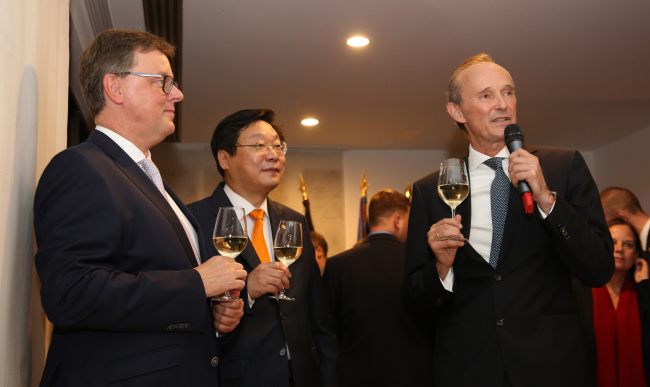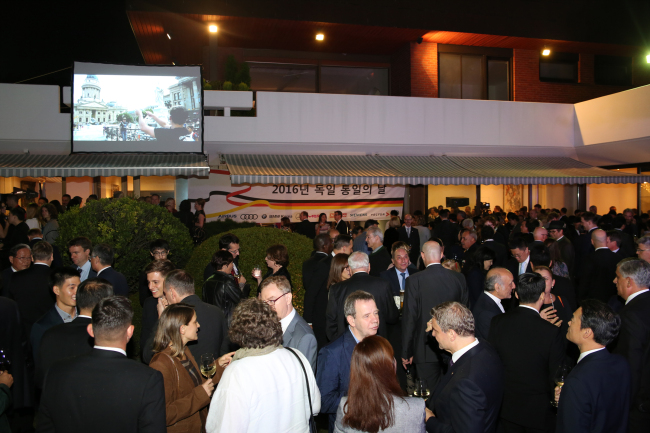Germany celebrates reunification, integration and cooperation with Korea
By Korea HeraldPublished : Oct. 9, 2016 - 22:49
Marking the 26th anniversary of national reunification, the German embassy celebrated Friday the country’s progress in integration following the fall of the Berlin Wall in November 1989, as well as international engagement, particularly with Korea.
At a reception at the German ambassador’s residence in Seoul, the newly appointed envoy Stephan Auer, who started his post on Sept. 5, welcomed the visit of Michael Grosse-Broemer, Chief Whip of the Christian Democratic Union-Christian Social Union parliamentary group in the German Bundestag.
“Oct. 3 is the German Unity Day in our country as well as the National Foundation Day in Korea,” Grosse-Broemer said in a speech. “Our two countries have made significant developments over the last 70 years, based on solid national economies, vibrant civil societies and liberal democracy.”
At a reception at the German ambassador’s residence in Seoul, the newly appointed envoy Stephan Auer, who started his post on Sept. 5, welcomed the visit of Michael Grosse-Broemer, Chief Whip of the Christian Democratic Union-Christian Social Union parliamentary group in the German Bundestag.
“Oct. 3 is the German Unity Day in our country as well as the National Foundation Day in Korea,” Grosse-Broemer said in a speech. “Our two countries have made significant developments over the last 70 years, based on solid national economies, vibrant civil societies and liberal democracy.”

As a key ingredient of the success, the German politician stressed that both nations helped one another in times of need, harnessing the “close, trustworthy partnership” enjoyed today.
Mentioning the service of more than 10,000 nurses and 8,000 miners from Korea, who toiled and moiled across Germany’s postwar industrial frontlines, he said: “All of them worked with no holds barred, without complaining. Germany will never forget their service.”
The miners in particular worked eight hours a day, five days a week, under temperatures reaching as high as 60 degrees Celsius, drinking as much as 10 liters of water daily, Grosse-Broemer said he heard.
“The sons and daughters of the first generation of Korean workers have built successful careers, with 70 percent of them earning university degrees,” he noted, adding their stories have inspired new immigrants.
Germany’s economic loan of 160 million German Marks helped enable the “Miracle on the Han River,” transforming Korea from war-ravaged shambles to an industrial powerhouse in the second half of the 20th century, the parliamentarian reiterated.
“Ultimately, grit, perseverance and a sense of duty have been the hallmarks of our success stories,” the German argued. “These are highly meaningful values to both our peoples. We have shared the belief that the free-market economy, not the socialist planned economy, guarantees welfare and social security of all.”
Citing the European Union-Korea free trade agreement that entered into full force last year, he also underscored that both countries benefited from the deal as export-focused economies.
On the domestic integration efforts encompassing institutions, economies and communities, Grosse-Broemer underlined that the financial weight of new federal states -- those that formerly belonged to East Germany -- has doubled, while employment rates have reached “unprecedented levels.”
“Making such headways has required tremendous efforts,” he emphasized. “Our integration is not finished. There is still a mountain of things to be done, but we Germans are moving on a highway toward our objectives.”
The politician offered excoriating words to North Korea, berating the regime’s nuclear tests and missile provocations this year. His Christian Democratic Union and Christian Social Union parties have also denounced Pyongyang and demanded stronger international sanctions.
“Against all odds, South Korea should not give up hope on a peaceful approach to unification,” he urged, saying, “Things could spiral out of control rather quickly.”
“When history opened the window toward unification,” according to the Chief Whip, “former German Chancellor Helmut Kohl was ready, unlike many other naysayers in politics.”
He pointed to Kohl’s “Ten-Point Plan for Germany Unity,” announced on Nov. 28, 1989, which laid out steps for democratizing and reunifying with the erstwhile German Democratic Republic. The program listed closer cooperation between the two states, institutional confederation, as well as East-West detente and European integration.
“Less than a year after the plan was proclaimed, the vision was made into a reality,” he claimed. “I want to recount a statement by Kohl’s longtime national security advisor Horst Teltschik, who said, ‘Those who do not believe in the impossible is not a realist.’”

Joo Hyung-hwan, Korean Minister of Trade, Industry and Energy, highlighted in a speech that Germany -- despite extreme socioeconomic and political disparities resulting from communism -- has accomplished “painful” structural reforms and reaped productivity gains from technological innovation.
“Cultivating regions of the former East Germany as manufacturing production bases and guiding balanced and equitable development, Germany has become the de facto locomotive of the European economy,” Joo alleged.
The experience of Germany provides two lessons to Korea in terms of ending its peninsular division and engineering sustainable development, the minister contended.
“First of all, Germany has shown leadership in managing tensions and leading integration through East-West reconciliation and regional and global alliances,” he asserted. “Secondly, Germany has reduced interregional disparities and achieved balanced development using innovative industrial policies.”
Indicating both countries have deepened economic cooperation “exponentially” over the years -- Germany being Korea’s largest trading partner in Europe and Korea being Germany’s third-largest in the Asia-Pacific -- Joo explained that the two sides have succeeded in joint ventures in electronic displays, solar batteries and information communications technology.
“Our two countries mutually face the urgent need to strengthen collaboration in innovation-driven and creativity-enhancing projects, in line with the new global paradigm of low growth and technological upheaval,” the Korean bureaucrat argued.
To flesh out the synergy, Joo advised nurturing bilateral partnership between vocational schools, including Germany’s Meister High Schools; industrial-academia cooperation encompassing world-leading research institutions such as the Max Planck Institutes, the Helmholtz Institutes and the Fraunhofer Society; and mutual investment in renewable energy, advanced materials, bio-health and the Internet of Things.
By Joel Lee (joel@heraldcorp.com)
-
Articles by Korea Herald







![[Graphic News] More Koreans say they plan long-distance trips this year](http://res.heraldm.com/phpwas/restmb_idxmake.php?idx=644&simg=/content/image/2024/04/17/20240417050828_0.gif&u=)
![[KH Explains] Hyundai's full hybrid edge to pay off amid slow transition to pure EVs](http://res.heraldm.com/phpwas/restmb_idxmake.php?idx=644&simg=/content/image/2024/04/18/20240418050645_0.jpg&u=20240419100350)






![[From the Scene] Monks, Buddhists hail return of remains of Buddhas](http://res.heraldm.com/phpwas/restmb_idxmake.php?idx=652&simg=/content/image/2024/04/19/20240419050617_0.jpg&u=20240419175937)

![[KH Explains] Hyundai's full hybrid edge to pay off amid slow transition to pure EVs](http://res.heraldm.com/phpwas/restmb_idxmake.php?idx=652&simg=/content/image/2024/04/18/20240418050645_0.jpg&u=20240419100350)

![[Today’s K-pop] Illit drops debut single remix](http://res.heraldm.com/phpwas/restmb_idxmake.php?idx=642&simg=/content/image/2024/04/19/20240419050612_0.jpg&u=)